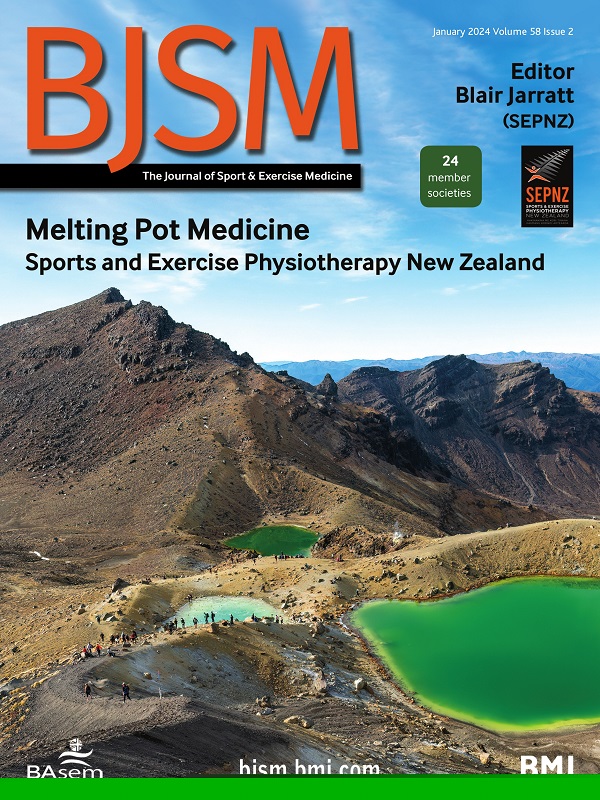高接触性团体运动对退役职业运动员心理健康和幸福感的影响:一项混合方法的系统评价。
IF 16.2
1区 医学
Q1 SPORT SCIENCES
引用次数: 0
摘要
目的了解退役职业高接触性团体运动(HCTS)运动员心理健康状况及其影响因素。设计混合方法系统评价。检索时间为2023年7月和2025年3月,检索时间为espsycinfo、Embase、Medline、SPORTDiscus和Scopus。入选研究的资格标准纳入了调查退役HCTS专业运动员心理健康和/或影响因素的研究。未经过同行评审、无法获得全文、使用二手数据或关注非精英/个人/低接触运动的研究被排除在外。结果最终纳入85项研究,包括53996名参与者(女性,n=247, 0.46%),来自6项运动(澳大利亚足球联盟、加拿大足球联盟、足球/足球、冰球、国家橄榄球联盟和橄榄球)。每种疾病的患病率范围各不相同;吸烟(0.9%-16%)、抑郁(3%-49%)、焦虑(4.3%-42%)、大麻使用(5%-15.7%)、不良饮酒(6.4%-68.8%)、阿片类药物使用(7%-23.6%)、压力(8.7%-26.9%)、非法药物使用(10%-63.2%)、焦虑/抑郁(10.2%-39%)和不良营养行为(23.8%-64.5%)。在包括M和SD在内的有效量表的研究中,抑郁、焦虑和睡眠障碍的得分与人群标准相当,而压力和不良饮酒的得分则为轻度或更高。脑震荡、疼痛、损伤、神经因素和身体功能下降对心理健康有负面影响。在以下方面观察到消极和积极的影响:运动员身份、社会心理支持、退休自主性、生活事件、骨关节炎、退休和认知功能。48%的研究具有良好的方法学质量;然而,大多数研究是横断面的,依赖于自我报告测量,缺乏随访数据和女运动员。结论HCTS退役运动员存在高水平的心理困扰和不良酒精使用,但抑郁、焦虑和睡眠障碍与人群正常值相似。这些结果要求对退役运动员采取更大的支持措施。普洛斯彼罗注册号crd42023449114。本文章由计算机程序翻译,如有差异,请以英文原文为准。
Influences on the mental health and well-being of retired professional athletes from high contact team sports: a mixed methods systematic review.
OBJECTIVE
To report the prevalence of mental health symptoms and influencing factors in retired professional high contact team sport (HCTS) athletes.
DESIGN
Mixed-methods systematic review.
DATA SOURCES
PsycINFO, Embase, Medline, SPORTDiscus and Scopus were searched in July 2023 and March 2025.
ELIGIBILITY CRITERIA FOR SELECTING STUDIES
Studies that investigated mental health and/or influencing factors within retired professional HCTS athletes were included. Studies that were non-peer-reviewed, could not obtain full text, used secondary data or focused on non-elite/individual/low-contact sports were excluded.
RESULTS
85 studies were included in the final review, comprising 53 996 participants (females; n=247, 0.46%) from six sports (Australian Football League, Canadian Football League, football/soccer, ice hockey, National Football League and rugby). Prevalence ranges varied for each condition; smoking (0.9%-16%), depression (3%-49%), anxiety (4.3%-42%), cannabis use (5%-15.7%), adverse alcohol use (6.4%-68.8%), opioid use (7%-23.6%), stress (8.7%-26.9%), illicit drug use (10%-63.2%), anxiety/depression (10.2%-39%) and adverse nutritional behaviour (23.8%-64.5%). Of the studies including M and SD of validated scales, scores for depression, anxiety and sleep disturbance were equivalent to population norms, whereas mild or higher scores were reported for stress and adverse alcohol use. Concussion, pain, injury, neurological factors and declined physical function were shown to have a negative influence on mental health. Both negative and positive influences were observed for: athletic identity, psychosocial support, retirement autonomy, life events, osteoarthritis, retirement and cognitive function. 48% of studies had good methodological quality; however, most studies were cross-sectional, relied on self-report measures and lacked follow-up data and female athletes.
CONCLUSION
Retired HCTS athletes experience high levels of psychological distress and adverse alcohol use, but depression, anxiety and sleep disturbance were similar to population norms. These results call for greater support measures for retired athletes.
PROSPERO REGISTRATION NUMBER
CRD42023449114.
求助全文
通过发布文献求助,成功后即可免费获取论文全文。
去求助
来源期刊
CiteScore
27.10
自引率
4.90%
发文量
217
审稿时长
3-8 weeks
期刊介绍:
The British Journal of Sports Medicine (BJSM) is a dynamic platform that presents groundbreaking research, thought-provoking reviews, and meaningful discussions on sport and exercise medicine. Our focus encompasses various clinically-relevant aspects such as physiotherapy, physical therapy, and rehabilitation. With an aim to foster innovation, education, and knowledge translation, we strive to bridge the gap between research and practical implementation in the field. Our multi-media approach, including web, print, video, and audio resources, along with our active presence on social media, connects a global community of healthcare professionals dedicated to treating active individuals.

 求助内容:
求助内容: 应助结果提醒方式:
应助结果提醒方式:


